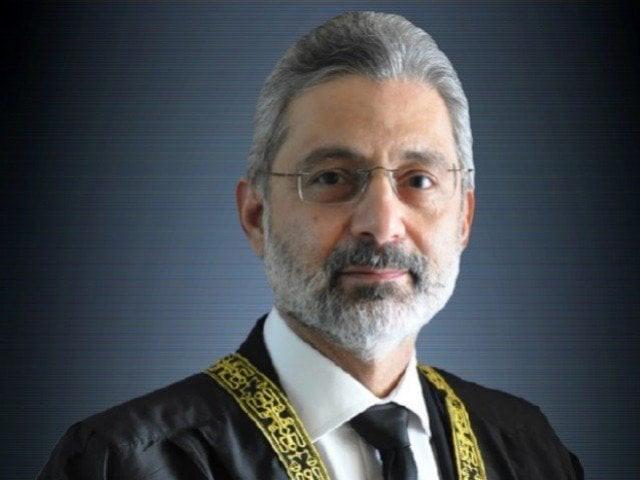PBC files for review of SC’s Justice Isa verdict
Petition states order compels FBR to do something that the law does not compel them to do

The Pakistan Bar Council (PBC) – the apex statutory body of the lawyers community – has challenged the Supreme Court majority verdict, ordering the Federal Board of Revenue (FBR) to seek explanation from Justice Qazi Faez Isa’s family members about the nature and source of funding for undeclared properties in their names.
In the review petition filed through Salman Akram Raja, the PBC raised objections against sending the matter to the FBR and said the tax authority was a government institution that “cannot hold an impartial inquiry into the matter”.
The petition states that the court order “compels tax authorities, and specifically the commissioner of Inland Revenue concerned to do something (issue notices to the wife and two children of Justice Isa) which the law itself (namely the Income Tax Ordinance, 2001) does not compel them to do”.
"There is no compulsion within the 2001 Ordinance on the tax authorities to issue notices to any individual. Such notices are only issued at the discretion of tax authorities after due application of mind and in accordance with law.
“As such, the Impugned Order violates Article 4(2) of the Constitution which provides that ‘no person shall be compelled to do that which the law does not require him to do’,” read the petition.
Moreover, by directing that notices be issued to Justice Isa’s family members, the court has assumed the powers and functions vested in the FBR by the 2001 Ordinance.
"This court has further compelled the FBR to place a report regarding the individual tax affairs of the third parties before the Supreme Judicial Council, on the presumption that any such report will contain information/findings that is/are of a nature that they should be placed before the Honourable Supreme Judicial Council. No such presumption could have been drawn."
It is also submitted that the procedure prescribed in the impugned order for the tax proceedings against the third parties, for example (inter alia) the strict and short timelines given to the FBR, the method of service on the third parties, purported grant of jurisdiction to the commissioner (Islamabad) and overlooking of limitation clauses contained within the 2001 Ordinance, has materially derogated from the methodology and substantive and procedural safeguards provided within the 2001 Ordinance for conducting such proceedings.
It is respectfully submitted that this Honourable Court cannot re-write or change the law as contained in the 2001 Ordinance. "Without prejudice to the forgoing, there is no basis in law for the direction contained in the Impugned Order for the report of the FBR in respect of the private individual tax affairs of the third parties to be placed before the Honourable Supreme Judicial Council. There is no nexus between the individual tax affairs of the third parties [and any tax liabilities arising therefrom (if any)], and the conduct of Justice Isa.”
By directing the FBR to send a report regarding the individual tax affairs of the third parties to the Supreme Judicial Council, the order has incorrectly assumed that such a nexus exists, adds the petition.
"The Impugned Order, by adjudicating upon the rights and liabilities of the third parties, has condemned the third parties unheard. The said third parties were not parties before this Honourable Court, they were never issued a single notice and they were not given any opportunity of hearing. The Impugned Order, therefore, violates a number of the third parties’ fundamental rights as enshrined in Article 10A (right to due process), Article 24(1) (right not to be deprived of property save in accordance with law), Article 25(1) (right to equal protection of law) and Article 25(2) (right not to be discriminated) of the Constitution.
“That this Honourable Court could not have passed the Impugned Order against the private third parties while exercising its original constitutional jurisdiction under Article 184(3) of the Constitution as the pre-conditions for exercising such jurisdiction are not met.
"The tax affairs of the third parties, in respect of which strict directions have been passed within the Impugned Order, do not involve any question of public importance nor do they relate to the enforcement of any fundamental right. On the contrary, as submitted above, the fundamental rights of the third parties have been violated by the Impugned Order."
The petition states that it is for the FBR to decide whether to place any findings arising out of tax proceedings in respect of the third parties, or any individual for that matter, before the Supreme Judicial Council and that too only after allowing the concerned taxpayer/s the opportunity to exhaust all forums of appeal and only if any such findings have some nexus with the conduct of a judge of the superior courts of Pakistan.
"Such powers of the FBR have been assumed by this Honourable Court within the Impugned Order and the matter referred to the Honourable Supreme Judicial Council without any of the pre-conditions having been fulfilled.
"That by allowing/permitting the Honourable Supreme Judicial Council to consider and proceed on the basis of the report placed before it by the FBR despite the pendency of any appeal/s filed by the third parties, this Honourable Court has nullified and rendered futile any such appeals, thereby violating the fundamental rights of the third parties enshrined in Article 4 (right of individuals to be dealt with in accordance with law), Article 10A (right to a fair trial and due process) and Article 25 (equality of citizens) of the Constitution."



















COMMENTS
Comments are moderated and generally will be posted if they are on-topic and not abusive.
For more information, please see our Comments FAQ